Physical Address
304 North Cardinal St.
Dorchester Center, MA 02124
Physical Address
304 North Cardinal St.
Dorchester Center, MA 02124

Mountain adventures unlock extraordinary health benefits beyond ordinary exercise that will transform your body and mind in surprising ways.
You’ve probably heard that exercise is good for you, but when you lace up those hiking boots and hit the trails, you’re revealing benefits that go far beyond what a typical gym workout can offer. From strengthening your heart to sharpening your mind, trekking transforms your body and spirit in ways that might surprise you. The mountain paths and forest trails hold secrets to better health that most people never discover.
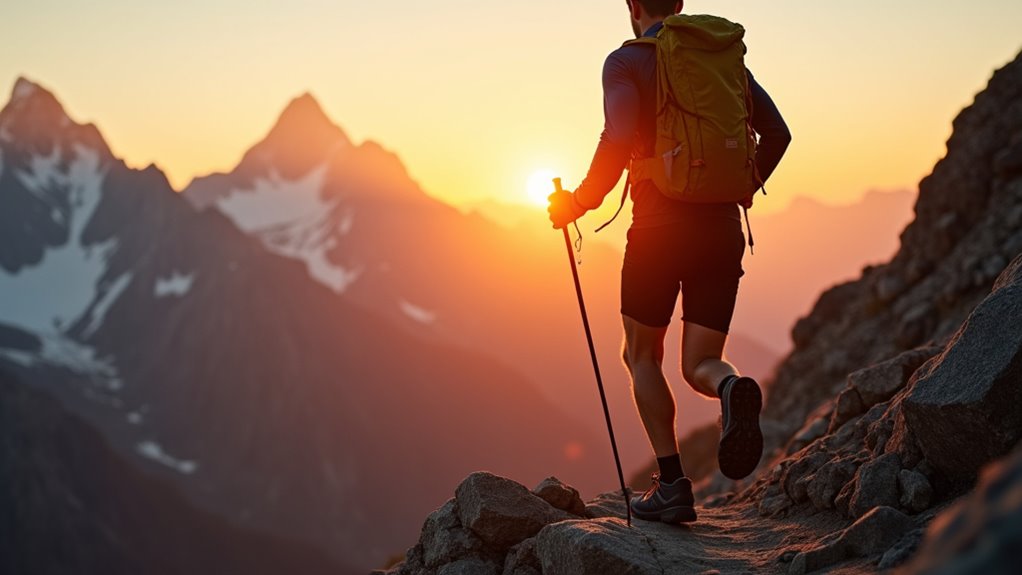
When you hit the trails regularly, your heart transforms into a more efficient powerhouse that pumps blood with less effort and greater strength. You’ll notice your resting heart rate dropping as your cardiovascular system adapts to the demands of uphill climbs and varied terrain.
Trekking naturally incorporates interval training – you’re pushing harder on steep sections, then recovering on flatter ground. This pattern strengthens your heart muscle while improving circulation throughout your body. Unlike monotonous gym cardio, hiking keeps you engaged with changing landscapes and challenges.
Your blood pressure typically decreases with consistent trail time, and you’ll develop better oxygen delivery to muscles. Many cultures have long recognized walking in nature as medicine – from Japanese forest bathing to Scandinavian friluftsliv. For those seeking the ultimate cardiovascular challenge, glacier climbing offers some of the most demanding terrain that will push your heart health benefits to extraordinary levels. You’re fundamentally getting prescription-strength cardio without the clinical setting.
Beyond strengthening your heart, trekking acts as a full-body resistance workout that builds muscle while fortifying your bones. You’re constantly engaging your legs, core, and back muscles as you navigate uneven terrain and carry your pack.
Trekking transforms your entire body into a powerhouse, simultaneously building lean muscle and strengthening bones through natural resistance training.
This weight-bearing exercise stimulates bone formation, helping prevent osteoporosis later in life.
Your calves and quads work overtime on steep ascents, while your glutes stabilize each step on rocky paths. Even your upper body gets involved when you’re using trekking poles or scrambling over boulders.
The varied terrain challenges different muscle groups in ways gym equipment can’t replicate.
Regular hikers often develop exceptional functional strength that translates to daily activities. You’ll notice improved balance, stability, and endurance that makes carrying groceries or climbing stairs feel effortless.
When planning multi-day adventures, choosing compact camping gear becomes essential for maintaining proper form and preventing strain during extended treks.
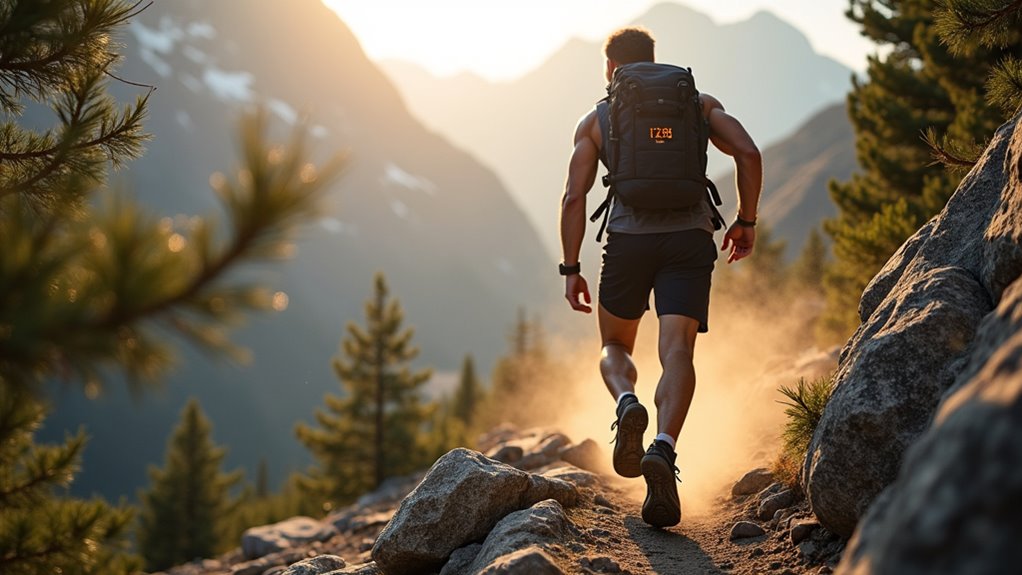
While building muscle matters, trekking’s real superpower lies in its ability to torch calories at an impressive rate. You’ll burn significantly more energy maneuvering uneven terrain than walking on flat surfaces, making it incredibly effective for weight management.
Your calorie burn depends on several factors, but here’s what makes trekking exceptional:
What’s brilliant about trekking is its sustainability. Unlike gym sessions you might skip, hiking feels like adventure rather than exercise. You’ll find yourself naturally walking for hours, creating the calorie deficit needed for healthy weight loss without the mental fatigue of traditional workouts.
Just like deciding whether to rent or buy equipment for any outdoor activity, choosing hiking as your primary fitness method offers long-term benefits that compound over time.
As you navigate rocky ledges and dodge tree roots on winding trails, your brain constantly calculates micro-adjustments to keep you upright and moving forward. This natural obstacle course transforms your hiking experience into balance training that gyms can’t replicate.
Uneven terrain forces your proprioceptors—tiny sensors in your muscles and joints—to work overtime, sharpening your spatial awareness.
You’ll develop better ankle stability as you step on loose gravel, improved core strength while crossing streams, and enhanced reaction times when encountering unexpected obstacles.
Regular hikers often notice improved stability in daily activities like climbing stairs or walking on wet surfaces.
Mountain cultures worldwide have long recognized this benefit, with Sherpa communities displaying remarkable sure-footedness developed through generations of traversing challenging terrain.
Before embarking on challenging hiking adventures in remote locations, consider securing travel insurance to protect yourself against potential injuries or emergencies that could occur on difficult terrain.
Your coordination skills will naturally strengthen with each adventure.
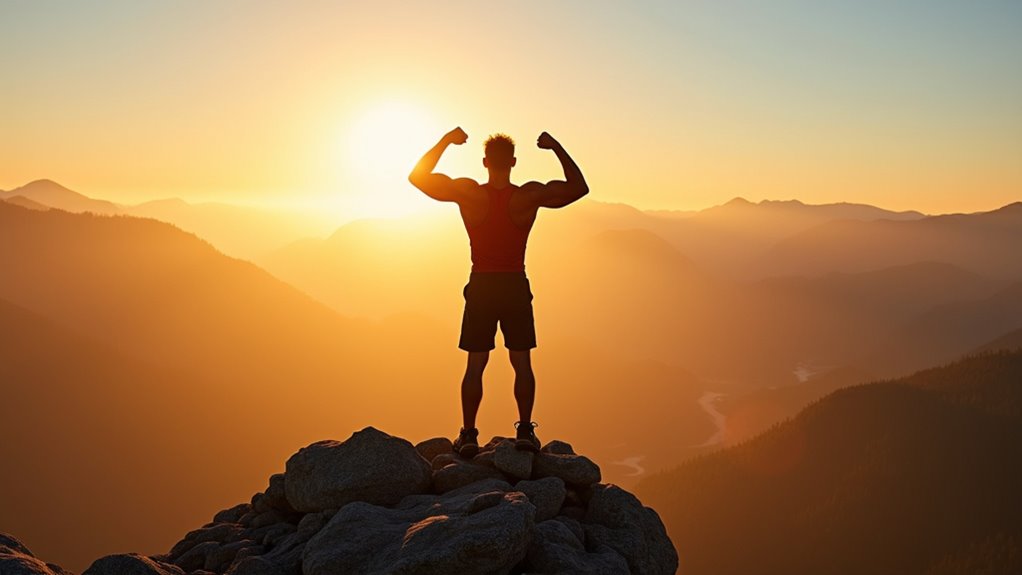
When you spend hours breathing fresh mountain air and exposing yourself to diverse natural environments, you’re essentially giving your immune system a thorough workout. Nature exposure introduces your body to various microorganisms that help build immunity naturally, while physical exertion boosts circulation and enhances white blood cell production.
Traditional mountain communities have long understood this connection, often showing remarkable resilience against common illnesses. Modern research confirms what they’ve practiced for generations.
Your hiking adventures strengthen immunity through:
You’ll notice fewer colds and faster recovery times as your body adapts to regular trail challenges and environmental variations. The health benefits of trekking and hiking extend far beyond just immune system strengthening, encompassing physical, mental, and emotional well-being improvements.
Beyond the physical gains, your mental state transforms dramatically once you hit the trails regularly. You’ll notice stress melting away as nature’s rhythm replaces urban chaos.
The repetitive motion of walking releases endorphins, creating that coveted “hiker’s high” that naturally combats anxiety and depression.
When you’re focused on orienteering terrain, your mind can’t spiral into worry cycles. This mindful presence acts like meditation in motion.
Studies show that spending two hours weekly in natural settings considerably reduces cortisol levels and improves mood regulation.
The digital detox aspect can’t be ignored either. Without constant notifications, your brain finally gets to reset.
Many cultures have recognized this healing power for centuries – from Japan’s “forest bathing” to Native American vision quests.
You’re tapping into an ancient remedy that’s scientifically proven to work.
These mental wellness benefits become even more pronounced when you incorporate family camping activities that encourage shared outdoor experiences and deeper connections with loved ones.
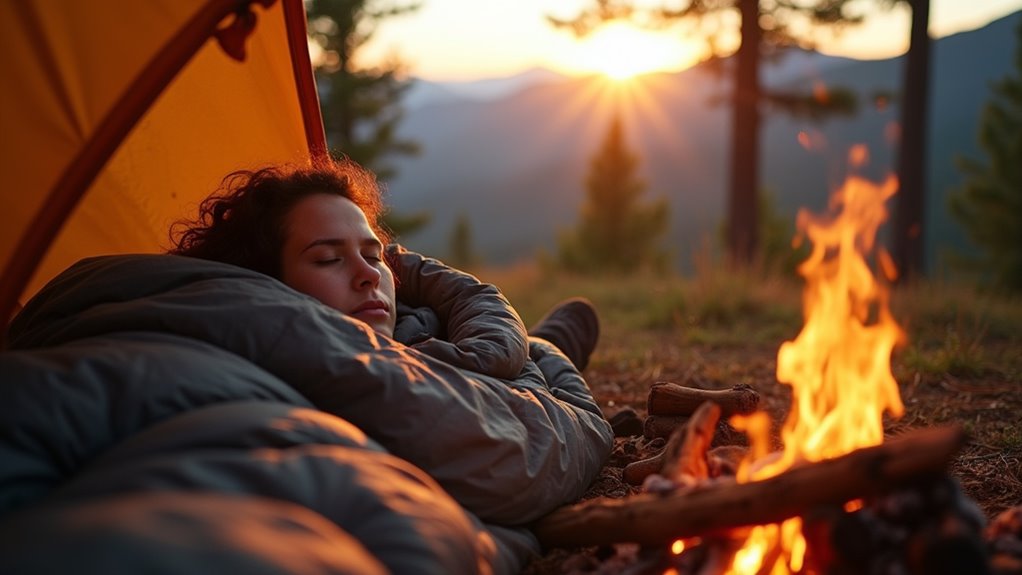
That mental reset from time on the trails pays dividends when your head hits the pillow. Trekking and hiking naturally regulate your circadian rhythm through sun exposure and physical exertion, creating the perfect recipe for restorative sleep.
You’ll find yourself falling asleep faster and experiencing deeper, more invigorating rest.
Physical fatigue from hiking triggers your body’s natural recovery processes, while the mental clarity from nature disconnects you from screen-induced sleep disruption.
Many cultures have long recognized walking’s sleep benefits—from evening strolls in Mediterranean villages to forest bathing in Japan.
Your improved sleep patterns typically include:
You’ll wake up feeling genuinely revitalized rather than groggy.
However, proper preparation is essential for quality rest, including knowing how to handle insect bites that might otherwise disrupt your hard-earned sleep during camping adventures.
Although modern life increasingly isolates us behind screens and closed doors, hiking trails naturally become gathering places where genuine connections flourish.
You’ll discover that shared challenges create instant bonds with fellow hikers. Whether you’re helping someone navigate a tricky section or sharing water during a tough climb, these moments forge authentic relationships that often extend beyond the trail.
Joining hiking groups or clubs connects you with like-minded people who value nature and wellness. You’ll find mentors among experienced hikers and opportunities to guide newcomers yourself.
Many cultures have long recognized walking together as essential for community building – from Japan’s forest bathing groups to Europe’s walking clubs.
For those seeking even deeper connections with nature and companions, joyful camping experiences can extend these trail friendships into multi-day adventures under the stars.
These outdoor connections often prove more meaningful than digital relationships, offering real support, accountability, and lasting friendships rooted in shared adventure.
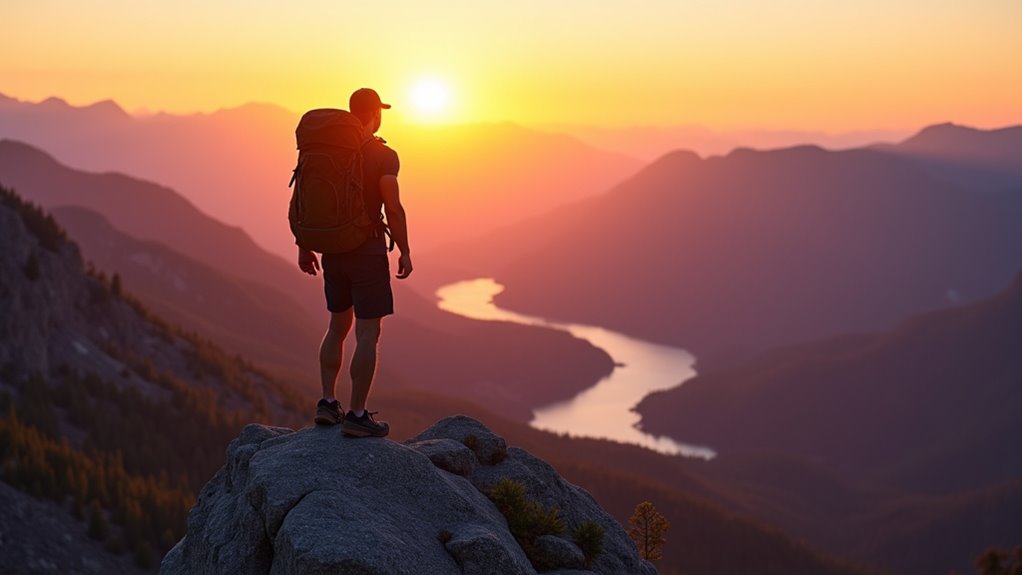
While immediate benefits like improved mood and better sleep draw most people to hiking, the long-term disease prevention advantages represent perhaps the most compelling reason to make trekking a lifelong habit.
Regular hiking strengthens your cardiovascular system, reducing heart disease risk by up to 35%. You’re also building bone density, which becomes vital as you age. The weight-bearing nature of trekking helps prevent osteoporosis more effectively than gym workouts.
Every step you take on the trail is an investment in stronger bones and a healthier heart for decades to come.
Your hiking habit creates powerful protection against:
These aren’t just statistics—they’re your future health insurance policy, earned one step at a time on the trail. For those following plant-based lifestyles, combining hiking with vegan-friendly camping creates an even more holistic approach to long-term wellness.
While you’re scrolling through endless social feeds indoors, your body’s craving the ancient rhythm of trail walking. You’ll discover that trading screen time for steep climbs transforms not just your physical strength, but your mental resilience too. Where modern life fragments your attention, hiking unifies mind and body. You’re not just burning calories—you’re building community connections that outlast any digital interaction. Your ancestors knew what you’re rediscovering: nature heals everything technology can’t.